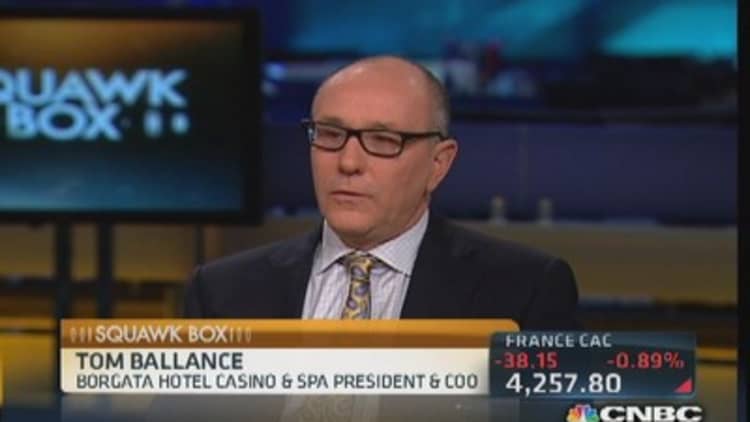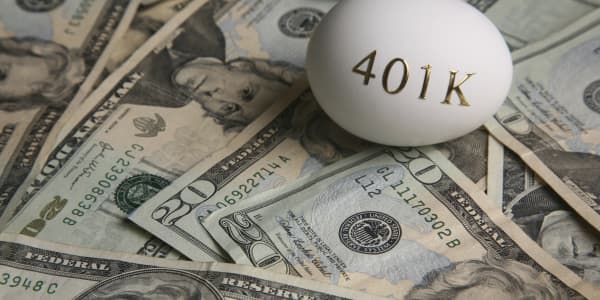Legalization of Internet betting in several U.S. states is turning the gaming industry on its head and turning some states, like New Jersey, into a case study for the promise and pitfalls inherent in Internet disruption of status quo businesses. New Jersey's gaming companies have emerged as pioneers in online gaming—Nevada and Delaware are the only competition—but the Garden State's big online bet is still stuck somewhere between cutting-edge technology and desperation in what has been a slowly dying market.
Many casinos never fully recovered from the Great Recession. A report released by the Nevada Gaming Control Board last week showed the state's largest casinos are $1.35 billion in the red for the most recent fiscal year—a loss for the fifth straight year.
But for New Jersey's Atlantic City, the downturn was compounded by Tropical Storm Sandy.
Gaming industry leaders are eager to come up with innovative ways to generate new revenue. "I believe that online gaming will evolve to become a major part of the American gaming industry," said David Schwartz, director of the Center for Gaming Research at the University of Nevada Las Vegas. "I see it as a shift in the way that people gamble, comparable to the change from table games to slot machines, which happened in the 1970s and 1980s."
The early results from New Jersey's entrance into online gaming are, not surprisingly, inconclusive, showing a struggling industry overall and a boost from online revenue that is modest. Atlantic City casinos reported a loss for the seventh straight year, with revenue falling below $3 billion in 2013 for the first time in 22 years, according to a report last week from New Jersey's Division of Gaming Enforcement.
Internet gambling revenue totaled $8.4 million in New Jersey from Nov. 21, 2013, when it began, through the end of December, according to the report. That's much less than the amount deemed necessary to reach the state's ambitious forecast of $1.2 billion by the end of the fiscal year, or even its more conservative forecast of $300 million.
(Read more: Delaware considers its option to revive gaming industry)
Betting on the Internet to transform a legacy business is clearly easier said than done.
"Operators and suppliers are going to have to reinvest capital and come up with new games and new ways to attract players to the New Jersey gaming market," said Lisa Spengler, spokesperson for the New Jersey's Division of Gaming Enforcement.
"The industry needs to stay aggressive to attract new customers both to land-based casinos as well as to Internet game play," said Spengler.

In the lead
There are a few clear winners in New Jersey's online gaming push.
The Borgata, which took in more than $3.7 million of online gambling revenue in the first month of operation, attracted the largest pool of players.
"On a combined basis, online and land-based poker revenue at Borgata was up more than 40 percent from our land-based play in December 2012," said Keith Smith, president and CEO of Boyd Gaming, which owns half of the Borgata. "Clearly, online gaming is complementary to our land-based business, not competitive."
The Garden State has already become the top destination for Internet betting, with 150,000 registered online gambling accounts, according to the state's Division of Gaming Enforcement—far more than Nevada or Delaware. Last week the New Jersey Devils and the Philadelphia 76ers announced a deal with partypoker.com, the first American major professional sports organizations to partner with an Internet gambling company.
If online gambling proves to be a hit, the Garden state could become a model in online gambling in the U.S.—or at least in getting more states to legalize it.
"The whole interest is in getting more tax revenue. … If you can legalize it and tax it, then the government's interest is in it," said Bill Dunkelberg, chief economist for the National Federation of Independent Business, a business advocacy group in Washington, D.C.
(Read more: Online gaming is more friend than foe: Borgata)

Experts said one advantage New Jersey has that not all states could leverage is a large population and economy.
"When you look at smaller states and you look at games such as poker, you need liquidity for those games to work," said Geoff Freeman, president and CEO of the American Gaming Association (AGA). "In states like Nevada and Delaware, that liquidity may not be there at this point in time."
Figures for the entire 2013 fiscal year for Delaware's gaming industry have not been released, but casino slot revenue was down more than 47 million in the first five months of 2013 compared to 2012.
Not all of the gaming industry's heavyweights are endorsing the Internet migration. Sheldon Adelson, chairman and CEO of Las Vegas Sands Corp., has been outspoken about his moral objections to online gambling. "'Click your mouse and lose your house' isn't a marketing slogan for advocates of legalized online gambling. But it should be," he wrote in Forbes earlier this year.
When the slot machine was new
Many gaming experts believe online gambling will prove to be profitable in the long run.
"If you were looking at monthly numbers trying to gauge the potential of slot machines in, say, 1965, you'd be at a loss, but ultimately that new technology had a big impact," Schwartz said.
Caesars Entertainment Corp., the largest casino company in the world, spun off its online gaming ventures as a separate publicly traded company, Caesars Acquisition, in November. This move was in conjunction with existing private equity partners Apollo Global Management and TPG Capital.
(Read more: )
"My guess is that online gambling will continue to expand and most states will approve it and it will continue to grow," Dunkelberg said. "Online gambling will increase the total volume of gambling revenues that happens, because people who want the ambiance will still fly to Vegas and go to Atlantic City or go to some casino in Philadelphia," he said.
And there may be a better early indicator of online gambling's potential than New Jersey's initial numbers. Internet gaming thrived on the black market after Congress passed the Unlawful Internet Gambling Enforcement Act of 2006, which made illegal any transactions between banks and online gambling sites. This ability to thrive—while illegal—revealed the industry's potential for revenue growth and has influenced not only states to pursue legalization but also, ironically, the federal government, which had initially banned it.
"The demand is there," Freeman said. "Americans spent about 3 billion dollars in online gaming in 2012 before it was even legal in the United States. That 3 billion was going to illegal offshore operators."
Because online gambling is an interstate commerce, like most Internet businesses, federal regulation is seen by some as an even better alternative than a state-by-state approach to regulation. One bill, introduced by Representative Peter King, R-N.Y., would legalize all forms of online gambling (except sports), create an oversight office at the Treasury Department and allow states to opt out.
Another bill, introduced by Representative Jim McDermott (D-WA), proposes a 4 percent federal tax on operators, and allows states to collect an additional 8 percent.
"It's not that I support or oppose Internet gambling; it's that I understand human nature," Congressman McDermott said in an email statement provided by a spokesperson. "Online gambling isn't going away, so we might as well make it safe and try to raise funds for programs that the public wants and needs."
The AGA argued that federal action would also curb illegal offshore Internet gaming sites. More states, and even the federal government, are beginning to see the potential of drawing consumers and the billions spent in illegal online gambling toward licensed and taxed domestic operators as a benefit that far outweighs the more immediate growing pains of developing a successful model for Internet betting in the U.S.
"I think online gambling is the next generation for gaming in America. In all products that we see in our society—whether books, music or other things that people enjoy—you have to adapt to the Internet," Freeman said.




